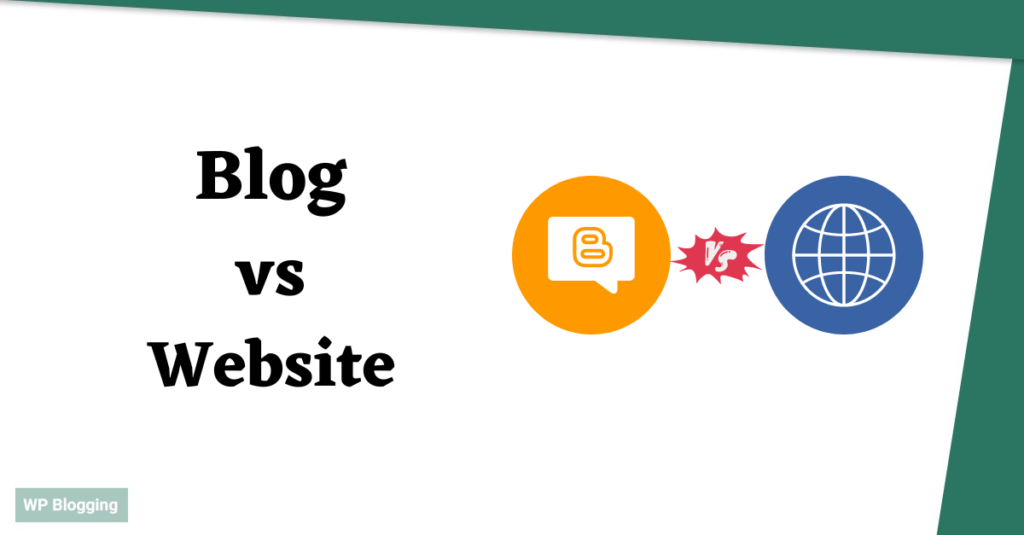Both individuals as well as businesses must have a strong online presence in the current digital era. The two primary platforms for exchanging information 📚, attracting audiences, and growing in popularity as the Internet evolves are blogs 📝 and websites.
They may satisfy various needs despite their early similarities and have diverse roles. In this article, we'll explore the precise differences 🔍 that set blogs 📝 apart from websites 🌐 while emphasizing their special advantages.

Table of Contents
ToggleBlogs vs Websites
Defining Blogs with Purpose and Precision
A blog, which is short for “weblog,” is an online platform that enables people and organizations to regularly upload 📝 content in chronological order.
Blogs are renowned for their intimate and informal style, which helps authors to build closer relationships with readers. They often address certain topics 📚, ranging from unique experiences and points of view 👁️🗨️ to professional analysis and business news 📰.
A blog's major objective 🎯 is to enlighten and amuse its readers while creating a sense of community among readers who have interests in the same things.
Unveiling the Depth of Websites
On the other hand, a website 🌐 serves as a more extensive and all-encompassing online presence. It features several pages with information about various businesses, people 👥, and subjects.
Websites may be used for a variety of purposes, such as promoting products and services 💼, communicating corporate information, and offering educational resources 📚.
In contrast to blogs ✍️, websites have a more official tone and look with an emphasis on organizing the information they provide.
Blogs vs Websites: Features
Content Structure and Format
One characteristic of blogs is reverse chronological order ⏳, with the most recent content prominently displayed on the site.
Thanks to this format 🔄, which encourages frequent updating ✏️, readers may easily get the most current material.
Websites, on the other hand, often have a predefined layout with specific sections for certain topics 📚. The hierarchical design of the material 🏗️ makes it easier for visitors to browse and find crucial information.
Interaction and Engagement
Blogs are great for promoting reader participation and conversation. Each post has comment sections where readers can share their thoughts 🗣️, ask questions ❓, and participate in the discussions.
This open discussion promotes a sense of community 👥 and encourages ongoing participation. Websites often lay more focus on delivering information than on permitting ongoing interactions, despite the possibility that they may incorporate contact forms 📝 and feedback mechanisms.
Tone and Writing Style
Blogs often have a more informal, conversational tone. By incorporating their personality into their works, authors often create a relevant and friendly 🌟 environment.
This strategy helps bloggers to build a close 🤝 relationship with their audience. Formal websites utilize a formal 📚 tone to establish a reputation and accurately convey information.
Frequency of Updates
When blogs are regularly updated with fresh content 🔄, they grow 🌱. The content is kept captivating by the frequent release schedule 🗓️, which encourages readers to return for the most current findings. Websites can be kept up, but they may not need as much constant content creation as blogs do.
Leveraging the Synergy: When to Use a Blog or a Website
Why Use a Blog?
If you want to communicate with a particular audience 👥, share personal stories 📖, or make remarks on a certain subject, a blog ✍️ is your best option. Blogs are excellent for establishing a devoted following, promoting discussions, and showcasing your expertise in a more casual atmosphere.
Why Use a Website?
Websites flourish when you need a solid platform to promote your business, organization, or brand. They are perfect 🌱 for providing in-depth explanations, highlighting products and services, and establishing a reliable online presence 🌐. You may design a unique user experience ✨ that meets your goals thanks to the extensive customization provided by websites.
Conclusion
In a world where digital interactions are the norm, it's necessary to be attractive online. The key is to provide valuable material that connects with your target audience, regardless of whether you want to launch a blog 📝 or invest money in a whole website 💻.
Remember that consistency, quality, and authenticity are all necessary for online success. By understanding the specifics of blogs 📚 and websites, you can make a decision that advances your aims and broadens your online impact.
In conclusion, whether you're producing insightful blog posts 📰 or a whole website, the world of online content creation offers endless opportunities for impact and connection. If you have the right resources and approach 🚀, you can successfully navigate this environment and achieve spectacular results.
Frequently Asked Questions
Do I need a website if I have a blog?
If you intend to mainly share your writing with the online world, a blog is suitable. However, if your blog is meant to back a product, online store, or a nonprofit cause, a website is necessary, and your blog becomes a section of that broader website.
What makes a website a blog?
A blog, often referred to as a “weblog,” functions as a digital diary or an informative site managed by a person, a group, or a company. It provides consistent fresh content, or “blog posts,” revolving around a specific subject. The entries are arranged in reverse chronological sequence and are composed in a casual, conversational manner.
Is a blog post the same as a website?
Website pages provide information about a company, while blog posts offer insights on specific topics. Unlike website pages that remain steady, blog posts are regularly published to provide up-to-date content.
What are the key differences when writing for a blog vs website?
Blogs constantly update their content, making them dynamic, while websites often remain static. Blogs lean towards an informal style, whereas websites maintain a formal and professional demeanour.